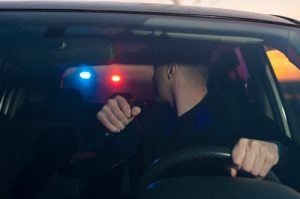 The last thing you want to see after you’ve been out with friends is the glimpse of flashing red and blue lights in your rearview mirror. Even if you haven’t had a sip to drink, this scene can incite anxiety in the calmest of people. There’s a lot going on, and if you don’t know what you’re supposed to do or how to act, the experience can be terrifying.
The last thing you want to see after you’ve been out with friends is the glimpse of flashing red and blue lights in your rearview mirror. Even if you haven’t had a sip to drink, this scene can incite anxiety in the calmest of people. There’s a lot going on, and if you don’t know what you’re supposed to do or how to act, the experience can be terrifying.
Rest assured, routine traffic stops are just that—routine. Once you understand your rights and responsibilities, the entire situation is a lot less stressful. Here are a few things you should know:
As Soon as You See the Lights
Pull over as soon as you see the flashing lights, as long as you’re in an area where it’s safe to do so. Use your blinker. If you’re on the highway, pull over onto the shoulder. If you’re in an urban or residential area where traffic may be an issue, pull over into the closest parking lot or alleyway where you and the officer who will be approaching your car can safely be out of the direct line of traffic.
Don’t forget to use your turn signals, and if you’re in an area where traffic is an issue, be safe by turning on your hazard lights.
The sooner you can pull over, the better you’ll be able to defend yourself in the event you need to point out obstructed views, a lack of speed limit signs, or other elements that might work in your favor. It’s best to pull over immediately, when possible.
When the Officer Arrives at Your Window
Be polite and calm. Even if you’ve had the worst day ever—or you’re being approached by a super aggressive officer—rudeness will get you nowhere. Roll down your window, turn off the engine, place the keys on the passenger seat or dashboard, and put your hands on the steering wheel. Even better, roll down the window and put hands outside which shows cooperation and awareness of office safety concerns. If you’re getting pulled over after the sun’s gone down, turn on your interior light. Officers appreciate people who are willing to work with them to make their jobs a little easier.
Never reach for anything, even if it’s just your registration. From a cop’s point of view, you could be reaching for a weapon or stashing something you’re not supposed to have on you. Hang tight until the officer tells you it’s okay to reach for the information he or she needs.
In the event you suspect the person who pulled you over may not actually be an officer, you’re within your right to ask for the officer’s photo ID and badge number. You can also ask to have a supervisor come to the scene or follow the officer back to a police station.
If the situation you’re in makes you feel afraid, use your best judgement to stay safe while still adhering to the law.
Related: The ‘Rising Blood Alcohol’ Defense in a DUI Case
Don’t be Suspicious
Officers can inspect your car if they have probable cause, so don’t give them any basis to suspect criminality. Never answer a question with a question (when you’re pulled over or otherwise). This will always be considered non-cooperative.
Beyond behavior, make sure you’re not driving around with items that could be construed as suspicious. If you’ve got a can of beer or a one-hitter on your passenger seat, an officer has every reason to search your car for more evidence.
If you or your passenger end up being arrested, the officer can search your vehicle. Anything he or she finds during the search may be held as further evidence against any indiscretions you may have had on the road.
Stay in Your Car Unless You’re Asked to Get Out
Always stay in your car unless you’re instructed otherwise. Getting out of your car without instruction immediately signifies that you could be a potential threat to officers, even if you just want to tell them your story. Stay in your car and answer the officer’s questions as clearly and concisely as possible. If you’re asked to get out of the vehicle, do so calmly and slowly so the cop knows where your hands are at all times.
Talking to the Officer
You may have been driving the car, but you’re not driving the conversation. Let the officer lead with questions, and only answer what he or she has asked. Never interrupt the officer or become argumentative. It’s also important not to be overly wordy with your responses. If you’re asked a yes or no question, answer yes or no: there’s no need to go into a long story about why you did what you did or what you think should have occurred. Officers are trained to interrogate you based on your responses. Stick with simple one-word answers when you can. If you’re not sure how to respond, it’s often best to say nothing at all. If you think you’ll be in trouble when it’s over, anything you say now could be used against you.
You have the right to ask for a lawyer but the right to counsel is not triggered until you are arrested. However, you do not have to answer questions suggesting you may have committed a crime, e.g. “How many drinks?” You could answer, “I do not give up my 5th amendment right to remain silent.”
If you’ve been arrested for a DUI in Los Angeles—whether it was at a routine traffic stop or otherwise—its important to have a reputable DUI defense attorney on your side as soon as possible. The steps following a DUI arrest can be cumbersome, and you certainly don’t want to walk into the courtroom all by yourself. Jon Artz is here to help. With over 40 years of experience under his belt, he’s helped people charged with DUI achieve the best possible outcomes from their situations, and he’ll help you, too.
Call Jon at (310) 820-1315, or contact him online to get help and put your worries to rest.


